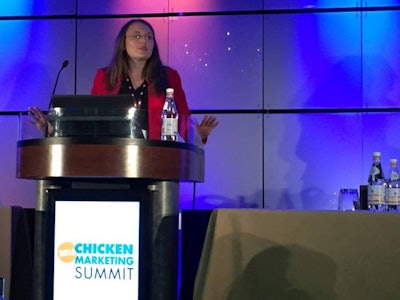
Many consumers are demanding antibiotic-free poultry meat and the food service industry is quickly adopting this policy for chicken as well. However, antibiotic policies are confusing and many different labels are currently being used that each have a different meaning. Responsible antibiotic use is one practical alternative to no antibiotics ever that may work for producers looking to curb their antibiotics use but that cannot afford or choose not to go totally antibiotic-free, explained Dr. Karin Hoelzer, DVM, Ph.D., officer in health programs, Pew Charitable Trust, at the Chicken Marketing Summit on July 11.
“No antibiotics ever is a good policy but it may not work for everyone and it may not work all the time. … Animals still do get sick and they do have to be treated, and there is an alternative,” said Hoelzer.
According to Hoelzer, responsible antibiotics use is an effective alternative to a no antibiotics policy because it is less expensive to produce chickens in this way than fully converting to no antibiotics, making it a more viable option for a greater segment of the industry. The policy allows for antibiotics, both veterinary and those medically important to humans, to be used for treatment and prevention purposes but only under veterinary oversight and only if really necessary for the health of the bird.
Further, she said, the need to treat sick birds will always exist in any operation. But because a responsible use antibiotics policy still allows for sick birds to be treated as prescribed by a veterinarian, there is no need for a secondary market to divert birds that are treated, as is required for those in a no antibiotics ever system.
For producers looking to adopt a responsible use policy, she explained that the Certified Responsible Antibiotic Use (CRAU) standard can help companies promote these products. The standard allows companies to label their products with the CRAU seal, making them easily identifiable and proving the products are verified by the U.S. Department of Agriculture (USDA). These products can then be marketed to institutions like schools and hospitals looking to purchase more affordable chicken products while still helping to cut the use of antibiotics.
The Chicken Marketing Summit, presented by the National Chicken Council and WATT Global Media, is being held July 10-12, 2016, at the Omni Hilton Head Oceanfront Resort in Hilton Head, South Carolina. The 2017 Chicken Marketing Summit will be hosted July 16-18, 2017, at the Historic Grove Park Inn in Asheville, North Carolina.

















